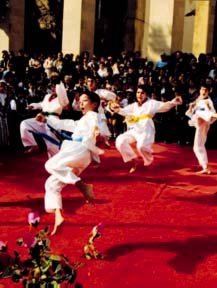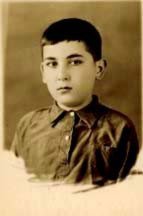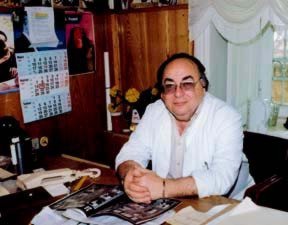|
Winter
1999 (7.4) Famous People:
Then and Now
Right: Aghabey Sultanov, 10, in 1949 and in 1999. Aghabey Sultanov has been working in the field of psychiatry for 40 years. For the past ten years, he has been head of the Psychiatry Department at the Medical University. Most recently, he has been a regular participant of the popular TV program called "Ailalar, Talelar" (Families, Fates). Family - related issues such as divorce, generation gap, relations with in - laws are discussed. Here he shares the impact that childhood had on his own life. What experiences and interests in childhood would you say shaped your life and career?  Photo: Karate performance at Children's Palace, Baku. October 1999. My mom was among those privileged few who attended Taghiyev's School (the first school ever created for girls in Azerbaijan, 1900 - 1918). My grandfather on my mother's side taught Arabic in a religious seminary in Azerbaijan. My father was an economist from a highly respected family. So, I passed a very privileged childhood. We lived in an apartment block on Zargarpalan Street where all our neighbors lived as one big family. I have vivid childhood memories, primarily because there was so much kindness and love in that small street. These days I miss that kindness and love. I remember the words of my favorite writer, Dostoyevsky. "Beauty will save the world," he said. But I think if he were alive today, he would admit, "Kindness, not beauty, will save the world." It seems to me that kindness somehow has diminished and evil has multiplied. But who will dare to acknowledge that evil gives rise to more evil, and that only kindness can save us from such malevolence? Baku was a marvelous city where you knew nearly everybody. In my childhood I loved to spend my time at my uncle Mirgasimov's place because so many famous people lived in his building (where the Bulbul Home Museum is located on Khaghani Street). There was the architect Pyotr Sapsay and well known writers Mirza Ibrahimov, Suleyman Rustam and Mammad Said Ordubadi. I remember climbing the stairs to my uncle's place and hearing Bulbul sing "Sevgili Janan" (Sweetheart). In the neighboring building there were singers like Alovsat Sadikhov, Hagigat Rezayeva and Muslim Magomayev. Also the actor Adil Isgandarov and great conductor Niyazi lived there. Who couldn't you find there! This was the history of my life, a childhood enriched by some of the most creative individuals in Azeri culture. When I finished high school, I wanted to be a doctor as well as enter the arts. My uncle, aunt and cousins were doctors and I had been interested in medicine since my childhood. But another of my uncles, Ajdar Sultanov was a "People's Actor of Azerbaijan". Our house was always bustling with actresses and actors. So when we went to the theater, it was like entering a sacred temple. But when I graduated, somehow everyone pushed me into surgery. So, in 1955 I entered Baku's Medical University. When I was about to graduate, I had an experience that changed my career - we visited a coroner's office where they were dissecting a cadaver. I decided not to become a surgeon. So when I accepted an appointment with the Republic Mental Hospital in Mashtagha, which is located in a distant suburb, my family was shocked because I could have worked as a surgeon in any of the major hospitals in Baku. But I preferred the mental hospital even though it was far away from home. In 1954, I had seen the German film "As Long As You Are With Me" starring the famous actor Otto Fischer who played the role of a psychiatrist. That's when my curiosity about psychiatry began. Of course, those first days in the hospital were very difficult. There were so few Azeri doctors working there and that discouraged me. And to tell you the truth those days were so horrible that I began wondering if I had done the right thing by choosing psychiatry. It seemed as though the doctors had just been waiting for someone, because as soon as I arrived, they took off on vacation and left me to head up one of the departments. Just imagine - me alone with 130 schizophrenics on cold winter nights. All of a sudden some of them would start howling and screaming, hitting and swearing at each other. I had all sorts of injuries from those early days. I was stabbed, stuck with a nail, had urine thrown on me. But you know, ironically, the more I suffered, the more I became attracted to this field. After working there awhile, I decided to continue my studies at the Moscow Scientific Research Institute of Psychiatry where I finished my post - graduate studies and got my Candidate degree. Then I went on to defend my Ph D. at the Scientific Psychiatric Center where I became a professor at the age of 31. In 1974 I returned to Baku to be with my wife's family - Alish Lambaransky, the well - known architect. For the past ten years, I have been heading the Psychiatry Department at the Medical University. How was your own childhood different from that of kids growing up today? I always tell my students: "When the day arrives that you say, 'Our youth was better than today's,' it means that you've grown older. Only old people criticize youth." But it does seem to me that our generation had more zeal for intellectual enrichment. Today that zeal is directed towards material enrichment. For example, today's youth aren't likely even to know the names of operas that we saw in our youth. We grew up when Elvis Presley was at his height of popularity with that new phenomenon called rock 'n roll. I remember we had a big yard with large old mulberry trees. My friends would gather and we would dance to Elvis Presley's music which, of course, wasn't so easy to do. And when my Granny got tired of the noise, she would call out: "Aghabey, don't these kids have homes? Their parents must be worrying. Let them go home." She didn't want to admit that she didn't like our music, so she simply suggested that perhaps we should disperse. Young people don't read that much today either. Recently, I saw an article in a French newspaper that complained that French and English young people are reading very little these days because they watch so much TV. I thought: "My God, it says they read 'very little', but ours don't read at all." But I wouldn't say that today's youth have become worse. No, they have their own virtues and they're more liberated. We used to be frightened by inspection commissions from Moscow; now, thank God, there is no such thing. Today's youth lives in luxury, in comparison, and their outlook is broader. Since early mankind, youth has always seemed to be headed in the wrong direction. But, you know, youth acts right. Today's youth are so wonderful. Of course, there are some who don't behave themselves correctly but, show me the country where there are no irresponsible, naive and naughty "bad guys". Why on earth should youth do the same things that we once did? Why can't they be different? I do regret that children have moved further away from family. But maybe it's our fault. Parents are at work all day long and when they finally get home, Father wants to lie down on the couch and read the newspaper, and Mother starts cooking dinner. The child goes up to his mom and wants to tell her what happened at school. But Mom interrupts and says that she knows what happened because she used to go to school, too. Then the child goes up to his Dad and tries to get his attention. But Dad wants quiet so he can continue reading the newspaper. So, the child goes into the street, joins his friends - good or bad - and moves away from home and family. Perhaps, it's our fault that we don't like today's youth. Perhaps, we didn't teach them the right way because we isolated them, because we were too busy. I don't see anything wrong with today's youth. Our childhood was different, but so it must be. Just imagine if my daughter or son acted as I did in the 1950s. Change shouldn't frighten us. I have a grandson who is my namesake - Aghabey. Now he's growing up and I think he's going to be even more progressive than his grandfather. You know, there's a saying, "You can't step into the same river twice." Our children don't have to repeat us. The youth shouldn't repeat what the older generation has done. That's why I don't have any special complaints about today's youth. What advice would you give to young people as they enter the 21st century? I think we're short on love today - love from home and family, love from friends. People have become colder in their relationships. As we enter the 21st century, I would both wish and advise youth to love and be loved. Believe me, love prolongs life. But you know, love must be frank, tranquil and selfless. Only then can it be called true love. What would you say is your greatest achievement in life? What do you want to be remembered for most? Balzac once said, "The more stupid a man is, the more he praises himself." The thing that delights me most is that I can feel different types of love. I love my wife, my son, my daughter and my grandchildren. I think this is my greatest achievement. As for my work, I can say that I could never imagine my life without psychiatry, because psychiatry is my destiny. If people smile when they think of me, I'll be very grateful. Perhaps, there may be many who smile because I've been teaching more than 30 years. Every year about 1,000 students sit in on my lectures, so that makes about 30,000 students. I like to think of myself as a very international person. It's chauvinism for one nation to hate another. Chauvinism is the unhappiness of a nation. Nationalism is when a certain nation prefers its idiots over another's clever ones. It's not the right attitude. Let another nation's smart ones bring more profit to your nation than your own idiots do. But I think that the greatest professional contribution that I have made to my nation is that I have brought 33 young Azerbaijanis, 33 intelligent persons into the field of psychiatry. In the past, we had only two or three. Today the Department that I head up has intelligent, highly educated, good - looking (which is also important) young people who speak good Azeri and Russian. This is the greatest achievement of my life. At least, I think so.
|


